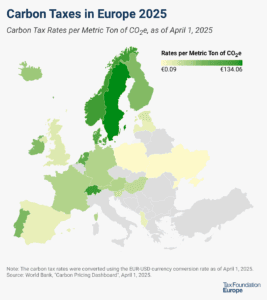
The Collaborative Economy—Data Exchange with Tax Authorities
4 min readBy:The following was presented at the European Economic and Social Committee’s hearing, “The Collaborative Economy – Data Exchange with Tax Authorities.”
When designing their supply chains and investing across borders businesses generally follow what makes most sense from an economic point of view. Nevertheless, over past decades there has been a significant shift in how countries design their international taxA tax is a mandatory payment or charge collected by local, state, and national governments from individuals or businesses to cover the costs of general government services, goods, and activities. policy and administrative procedures. This has changed the incentives that businesses face when organizing their supply chains and subsidiaries across the globe. Therefore, the economic reason for a certain structure may contradict with what makes sense from a tax point of view.
Many of the recent changes implemented by the international corporations were initiated by policy changes from the Base Erosion and Profit Shifting (BEPS) project. Just as the BEPS opportunities created different incentives for business investment by multinational corporations and the design of their supply chains, this new policy will also change those incentives.
Tax policy requirements can have a direct impact on the cost of capital, the ability for businesses to invest across borders, and the flow of goods around the world. Careful analysis is required to avoid policies that create real barriers to growth.
A common trade-off faced by a business is a choice between paying more taxes in a country versus having the real investment in the first place.
Economic evidence shows that country-by-country reporting impacts business investment decisions due to the tax implications of the reporting requirements. This shows up in evidence on tax costs of businesses subject to CbCR and on the behavioral responses of businesses to the reporting requirements.
In the face of the economic consequences, the European Commission has proposed making public CbCR a requirement for European multinational companies that have global revenues of more than €750 million per year.
The economic impacts are real, but compliance costs matter as well.
Policymakers also face a choice between higher tax transparency with administrative processes that are easy to comply with and very complicated and detailed rules. Increasing the cost of doing business, either through compliance burdens or higher taxes, has real-world implications beyond raising more tax revenue from businesses.
From a taxpayer perspective, it is important to have reporting requirements that are easy to comply with. While large uniform systems have many benefits, they may also entail problems. Let me elaborate on this.
Businesses that operate across boarders would benefit from a uniform reporting system in the EU, but a common and uniform reporting system may not be neutral. If the system is complicated and requires substantial investments in computer and IT facilities and in skilled labor for the purpose of reporting, only large companies will be able to make the investment. The reporting system may become an obstacle for smaller or newer firms to enter the market or operate across borders. This is bad for competition and bad for the consumers.
It should be recognized that the compliance costs faced by companies rise if transactions are subject to real-time tracking for income and VAT purposes.
More than 80 countries have already implemented requirements for companies to use e-invoicing for reporting taxes on business transactions.
There are big problems for international companies to comply with disparate and changing requirements in each of the operating countries. Even if only the software requirements were to be taken into consideration and the continuous updates needed, the operating costs rise significantly with each country they work in.
Complying with the reporting requirements can be incredibly expensive, and potentially prohibitive. Christiaan Van Der Valk, vice president of strategy at Sovos, a tax software company, estimates an additional $5 million in annual expenses for a global company operating under unreliable and ever-changing country rules while continuing to maintain a parallel global billing system.
There is limited but important evidence on how tax reporting systems might impact companies and the economy as a whole. The main implications of the reporting requirements could be summed as:
- First, if there is a threshold for compliance, companies will try to shift their activities to avoid reaching that threshold.
- Corporations might also reevaluate what they are doing—for example, to drastically reduce the number of entities subject to reporting requirements.
- Last but not least, as tax costs increase it might affect companies’ capital investment decisions and whether they enter the market or not. It is important that small companies also can enter a market without a cliff effect of new reporting requirements and associated costs.





